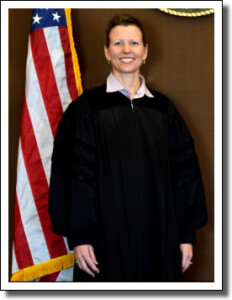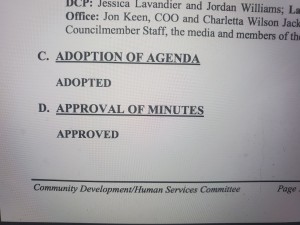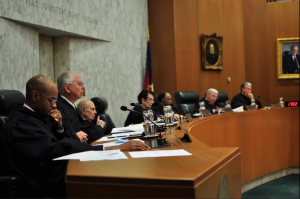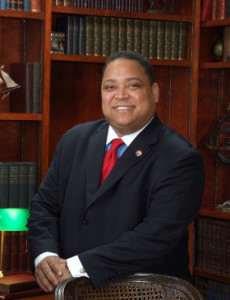Judge Ellerbe Ok’s Unrecorded Votes in Atlanta, despite Supreme Court Ruling
 (APN) ATLANTA – A Fulton County judge has ruled that government agencies like the City of Atlanta need not list in the minutes of agency meetings who voted which way for unanimous votes, even when failing to list the yeas or nays would lead the public to believe false information about who did or did not participate in the vote.
(APN) ATLANTA – A Fulton County judge has ruled that government agencies like the City of Atlanta need not list in the minutes of agency meetings who voted which way for unanimous votes, even when failing to list the yeas or nays would lead the public to believe false information about who did or did not participate in the vote.
“The Court finds the statute [Georgia Open Meetings Act] allows for the presumption that an action was approved by everyone who was in attendance, regardless of whether they were seated or not,” Fulton County Superior Court Judge Kelly Lee Ellerbe wrote in a Dec. 17, 2021 Order.
In the Dec. 17, 2021 Order, Judge Ellerbe granted in part a motion by the City of Atlanta seeking to dismiss a lawsuit brought by Atlanta Progressive News.
Judge Ellerbe allowed the case, APN v. City of Atlanta, to continue, though, because the meeting minutes at issue also omit the movers and the seconders for the votes at issue, which, she ruled, were required in any event.
APN intends to file a motion for reconsideration; and, if that is unsuccessful, an appeal. An appeal would be delayed for some time because it could not be filed until the issue of the movers and seconders is resolved.
At issue are the Committee Meeting minutes of the Atlanta City Council, a great many of which fail to list the movers, seconders, yeas, nays, abstainers, or absences for several votes.
 As previously reported by APN, the minutes merely state that the Committee approvals of the minutes from the previous meeting and the agenda were “approved” or “adopted”.
As previously reported by APN, the minutes merely state that the Committee approvals of the minutes from the previous meeting and the agenda were “approved” or “adopted”.
However, APN contends that this violates the Georgia Open Meetings Act’s requirement that Georgia agencies publish meeting minutes that include a record of all votes.
The Act states: “The name of each person voting for or against a proposal shall be recorded.”
Clearly, that did not happen because the yeas are not listed.
Judge Ellerbe ruled that the next sentence in the Act eviscerates the first and allows agencies to force a false presumption upon the people of Georgia.
“It shall be presumed that the action taken was approved by each person in attendance unless the minutes reflect the name of the persons voting against the proposal or abstaining.”
 Now, as APN readers are well aware, the Supreme Court of Georgia previously ruled in 2012, in Cardinale v. City of Atlanta, a case brought and won by APN’s News Editor the last time the City of Atlanta fought for secret votes, that that very language does not allow for a false presumption.
Now, as APN readers are well aware, the Supreme Court of Georgia previously ruled in 2012, in Cardinale v. City of Atlanta, a case brought and won by APN’s News Editor the last time the City of Atlanta fought for secret votes, that that very language does not allow for a false presumption.
https://casetext.com/case/cardinale-v-city-of-atlanta-2
In the 2012 case, the City of Atlanta had argued that that language meant that if the City chose not to list nays even when there were nays, the public had to presume the nays were yeas. At the time, in 2010, Fulton County Superior Court Judge Christopher Brasher agreed with the City; however, he was overturned.
The Council had voted in 2010 in a vote of seven to eight while having lunch at the Georgia Aquarium regarding whether to change Council rules, but refused for three years to tell the public who the yeas and nays were.
“Construing the statute to mandate a presumption contrary to fact would produce unreasonable results,” the Supreme Court of Georgia wrote in Cardinale v. City of Atlanta (2012).
“We cannot conclude that the General Assembly intended to require members of the public to presume, incorrectly, that a non-unanimous, non-roll-call vote was, in fact, unanimous or intended that such a presumption govern even if some members of the public know from attending the meeting or otherwise that the vote was split,” the Supreme Court of Georgia wrote.
What APN is now arguing is that if the City of Atlanta cannot force the people to believe that a nay vote was a yea vote, then likewise the City also cannot force us to believe that a non-vote (or an absence from a vote) was a yea vote.
If Judge Ellerbe’s ruling stands, this means that every time a Councilmember steps away from their seat, they run the risk of being recorded as a yea vote and of their constituents holding them accountable at elections for taking a vote they did not take.
The Jan. 14, 2020; Jan. 28, 2020; Feb. 11, 2020; Feb. 25, 2020; March 10, 2020 official meeting minutes of the Community Development/Human Services Committee each make it seem like all Committee Members who were present at some point during the meeting approved the agenda and approved the minutes.
 However, a review of the meeting videos reveals that Councilman Michael Julian Bond (Post 1-at-large) absent for one of the five meetings and late for the other four; he did participate in any of the ten votes.
However, a review of the meeting videos reveals that Councilman Michael Julian Bond (Post 1-at-large) absent for one of the five meetings and late for the other four; he did participate in any of the ten votes.
For the four meetings where he was present but late, the minutes falsely create a presumption that he voted a total of eight times even when he did not do so any of the times.
In addition, Natalyn Archibong (District 5) did not participate in the Jan. 14, 2020 votes; Antonio Brown (District 3) did not participate in the Jan. 28, 2020 votes; and Joyce Sheperd (District 12) and Amir Farokhi (District 2) did not participate in the March 10, 2020 votes.
As previously reported by APN, the City of Atlanta has spent over 307,000 dollars in taxpayer funds on private attorneys in fighting against APN’s News Editor and APN in Court between June 2020 and September 2021. The actual number to-date is estimated to be at around four hundred thousands dollars if not half a million.
APN strongly believes that this harmful and antidemocratic ruling will be overturned in Georgia appellate courts.
(END / Copyright Atlanta Progressive News / 2021)